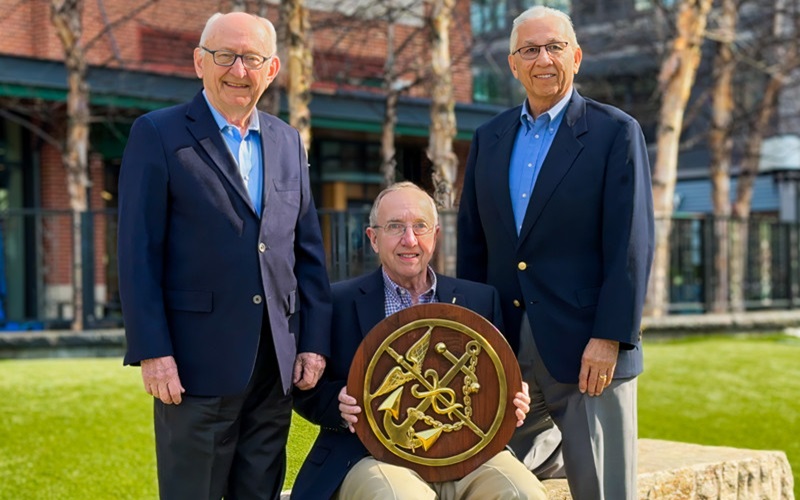
One pharmacist played guitar in a band as a teen. Another is a licensed airplane pilot. Two are enrolled members of Native tribes, and all have a unique story to tell about pharmacy and public service.
What these eight pharmacists have in common is that each served as the chief professional officer (CPO) for pharmacy in the U.S. Public Health Service (PHS) Commissioned Corps sometime between 1987 and 2022.
Now, thanks to an archive hosted by the American Institute of the History of Pharmacy, anyone can access a collection of transcribed oral histories that provide unique insights about PHS pharmacy through the lens of these CPOs’ lives and experiences.
Former CPO Richard M. Church described the oral history collection as a living resource for all sectors of pharmacy practice.
“We learn from stories, whether it’s in our family or our communities — but, in this case, our profession,” Church said in an interview. “This project was a way to capture a few career stories that would be of benefit to all those coming after.”

Image courtesy of Richard M. Church.
The oral history project was conceived and created through the work of Church, Richard J. Bertin, and retired ASHP Deputy Executive Vice President William A. Zellmer. The interviews were conducted, recorded, transcribed, and edited by the three of them as a voluntary effort without any external support.
CPOs
CPOs promote an array of initiatives on behalf of the U.S. surgeon general and support the recruitment, retention, and career development of Commissioned Corps officers. Pharmacy is one of 11 PHS professional categories with a CPO. Each CPO is appointed by the surgeon general for a four-year term.
The oral history collection doesn’t include accounts by former CPOs George F. Archambault (a past president of ASHP), Allen J. Brands, and Richard Ashbaugh, who died before the project was conceived. But some of the histories include commentary about how Archambault and Brands influenced PHS and the profession.
The histories also feature recollections from the CPOs about their early lives, the importance of friends and family, and personal interests outside of the pharmacy profession — including flying as a licensed pilot (Pamela S. Schweitzer) and making music in a band (J. Tyler Bingham).
Chief professional officers and their terms:
- J. Tyler Bingham
(2018-2022) - Pamela S. Schweitzer
(2014-2018) - Scott F. Giberson
(2010-2014) - Robert E. Pittman
(2006-2010) - Richard S. Walling
(2001-2005) - Fred G. Paavola
(1996-2000) - Richard J. Bertin
(1992-1996) - Richard M. Church
(1987-1992)
Innovations at the Indian Health Service (IHS)
The oral history collection describes how IHS hospitals provided opportunities for the future CPOs to establish novel clinical pharmacy services, work collaboratively with other healthcare providers, take on new responsibilities, and develop leadership skills.
Church, in his oral history, stated that IHS pharmacists in the 1960s routinely used information in patient medical records to implement innovative patient care services and set the stage for further advancements.
“Having access to the medical record gave IHS pharmacists an information base that nobody else in the pharmacy profession had,” Church’s history states. He added that because IHS physicians often came to the pharmacy to write their medication orders, pharmacists were on hand to share their expertise and influence medication decisions.
Robert E. Pittman, who started his PHS career at Whiteriver Indian Hospital in Arizona in the mid-1980s, also viewed IHS as a place to practice pharmacy at its best.
“I was able to do all the things that I had learned about in school, such as patient counseling in private counseling rooms, rounding with physicians on inpatient service, and working in both the inpatient and outpatient pharmacies — many activities that pharmacists in the private sector really hadn't started doing at that time,” Pittman shared in his oral history.
Practicing pharmacy for IHS had special meaning for Church and Pittman; Church is an enrolled member of the Match-e-be-nash-she-wish Band of Pottawatomi Indians of Michigan, and Pittman is enrolled in the Yankton Sioux Tribe.
PHS and the Vietnam War
Several of the oral histories provide candid insights on how PHS pharmacy was shaped by the Vietnam War.
Church’s history notes that when the military draft was in effect, becoming a PHS officer fulfilled one’s military service obligation. He said this led to “very high competition to get into the Public Health Service.”
Both Bertin and Richard S. Walling described how the draft influenced their education and early careers. And former CPO Fred G. Paavola’s history recounts how, as a student, he entered a Reserve Officers’ Training Corps program that provided a path to fulfill his military obligation as an Army pharmacist instead of being assigned to a different specialty.
When the draft ended, PHS recruitment slowed. The service also had to contend with the restructuring of the federal public health workforce, the closure of PHS hospitals, and the elimination of some PHS positions. Some of the former CPOs described how events like these affected the lives, career trajectories, and morale of the PHS pharmacy workforce.
“One great challenge was always the politics in the background and threats to the ongoing success of programs,” Bertin noted in his history. “We have to kind of just close our eyes to those and trudge on and do the best we can for the programs and the people that we're serving.”
Pharmacy’s federal footprint
In describing their own careers, the CPOs highlight the diversity of opportunities for professional growth that federal agencies provide for Commissioned Corps pharmacists.
Starting in 1991, Pittman spent several years with the Health Resources and Services Administration, where he focused on recruitment and retention, peer review, grant review, and other administrative duties. His history states that during that period, many other PHS pharmacists were likewise taking on clinical and administrative roles at the Food and Drug Administration (FDA), the National Institutes of Health (NIH), and other federal agencies.
“When I went to pharmacy school, no one talked about a pharmacist doing drug evaluations at the FDA or research at NIH; we only heard about retail and hospital pharmacy. But . . . those were the kinds of opportunities that were becoming available, because pharmacists were able to show they had a diverse set of skills,” Pittman stated.
Bingham spent more than a decade as a pharmacy chief and HIV specialist for the Federal Bureau of Prisons (BOP) before becoming CPO for pharmacy in 2018. According to Bingham’s oral history, BOP’s outcomes-focused pharmacy services for HIV became a model for pharmacist-managed care of patients with hepatitis C, mental health conditions, and other healthcare needs.
“By the time I retired from the Bureau, probably a little over 70% of all our pharmacists had prescribing rights, so they could prescribe medications and treat patients; they were basically providers,” Bingham stated.
Walling’s tenure as CPO was preceded by a dozen years of service as an international health officer for the Department of Health and Human Services, where he directed bilateral cooperation initiatives in the Middle East and, later, the Americas. In his oral history, Walling stated that he initially thought the assignment was outside his purview. But after interviewing for the position, he was confident that the skills he had acquired as a pharmacist and an administrator were applicable to this international work.
“Coming away from the interview, I wanted the challenge,” Walling stated. “I understood the learning curve would be very steep, but in the long run I saw the potential to take on new opportunities.”
Before Schweitzer became CPO, she served at the Centers for Medicare & Medicaid Services, where she helped state Medicaid programs upgrade their information technology systems to meet Affordable Care Act requirements. She recognized that state Medicaid programs can designate pharmacists as healthcare providers whose services are eligible for reimbursement — unlike Medicare Part B, which must be amended under federal law to confer similar status to pharmacists.
“The challenge was educating pharmacy organizations to start working with their state Medicaid programs,” Schweitzer stated in her oral history. She added that she traveled all over the country to give presentations about the topic. According to ASHP, 32 states now allow individual pharmacists to enroll as Medicaid providers.
The federal response to the Sept. 11, 2001, terrorist attacks also resulted in novel service roles for CPOs and other Commissioned Corps officers.
Scott F. Giberson, who was a chief pharmacist for two IHS healthcare facilities in Minnesota at the time of the attacks, became a founding member of the Department of Homeland Security (DHS) when it was established in 2002. He served as the DHS lead for all national nursing and pharmacy response teams as they were increasingly deployed to disaster sites. After his term as CPO, he led the U.S. federal response to the 2014 Ebola outbreak in West Africa, for which he received the first-ever Commissioned Corps Presidential Unit Citation, awarded in 2016.
“We made a huge impact as the Commissioned Corps and as a uniformed service,” Giberson stated in his oral history. “There was no other U.S. government entity that had both the authority and the capability to do what we did in in Africa.”
Reflections on PHS service
Bertin, who served in the corps for nearly three decades, explained in an interview that “once you get involved in in the public health service, it seems to take hold of you.”
In telling their stories, the eight CPOs — who together account for more than 225 years of PHS service — convey their dedication to the Commissioned Corps and its mission.
“It was truly an honor to serve, and I was humbled by the esprit de corps within the pharmacy category,” Bingham stated in his oral history.
Zellmer said he hopes the collection will reach and find relevance with a broad pharmacy audience.
“Pharmacy history is undervalued today by most pharmacists,” he said. “This collection of interviews can provide great lessons in how PHS pharmacy officers helped advance pharmacy practice as a whole and complemented what leaders in other sectors of the profession were doing.”
The PBS documentary Invisible Corps, which aired in May 2023, covers the history of the PHS and the evolution of public health. The program features two CPOs who were interviewed as part of the oral history project.








